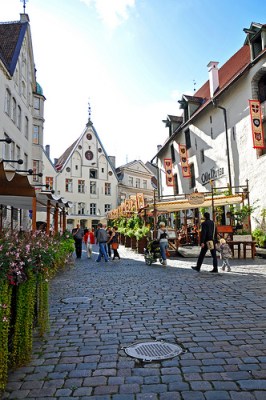The Baltic country of Estonia — known as the birthplace of Skype and a go-to market for tech companies in the U.S. and elsewhere needing developers — is making another IT investment so that younger generations can keep growing that reputation. Today, it announced Smartlab, a public/private partnership with companies including Skype’s now-owner Microsoft, which will see the creation of hobby groups for 10-19 year olds to get instruction in robotics, programming and mobile app and web design. Initially, Smartlab is starting out with €140,000 ($182,000) of funding to cover 36 groups and 500 students nationwide, with the after-school program running during the academic year.
This follows on from another program announced in September, in which the Estonian government said that it would start teaching students to code from first grade (aged seven). That program has so far received €70,000 ($91,000) in funding, according to Forbes.
While the first program is incorporating computer science into the school curriculum, Smartlab is more of an after-school effort — giving kids that are especially interested the resources to build on the knowledge they’re picking up in class.
Estonia, a country of 1.3 million people, has numbers to back up that programs like this could help its economy. It’s produced stats that indicate that each IT job creates “twice the added value for Estonia compared to the average in other economic spheres.” In other words, it’s not a particularly wealthy country, and these skills contribute a much-needed boost to its GDP.
Microsoft, by way of its Skype ownership, is already one of the companies contributing to the IT rush in Estonia; this latest effort is part of its YouthSpark initiative, which it says is about backing IT education projects that in all cover 300 million people across 100 countries (300 million people who likely leave the programs with positive impressions of Microsoft, too).
“Through partnerships with governments, non-profit organisations and other companies, Microsoft YouthSpark aims to empower young people to imagine and realise their full potential,” said Rain Laane, General Manager of Microsoft Baltics, in a statement.
Besides Microsoft, other private backers of the project include EMT and Elion, telecoms companies owned by Sweden’s TeliaSonera, Europe’s 5th largest telecommunications group.
The Smartlab groups will be evenly split between junior and upper schools, and about half the investment will go towards robotics, with the rest going to mobile and web app design as well as other coding. Some groups will focus on specific areas like 3D modelling, or computer building, with languages used in the groups covering Estonian, Russian and Seto — the three dominant languages spoken in the country that was once part of the Soviet Union.
Vaata Maailma Foundation, the foundation behind the project, has been working on other IT education initiatives since 2001. They have also helped with IT education programs for adults, as well as public awareness campaigns about IT, and creating public Internet access points for those without computers to get online. VMF’s chairman Enn Saar says the country has an internet penetration of 76.5% per capita, and 70% per household. And it’s been very forward in how the Internet is used by the general population: in its last parliamentary election in 2011, nearly one quarter of voters put in ballots online and via mobile phones.
[Photo: Archer10, Flickr]
